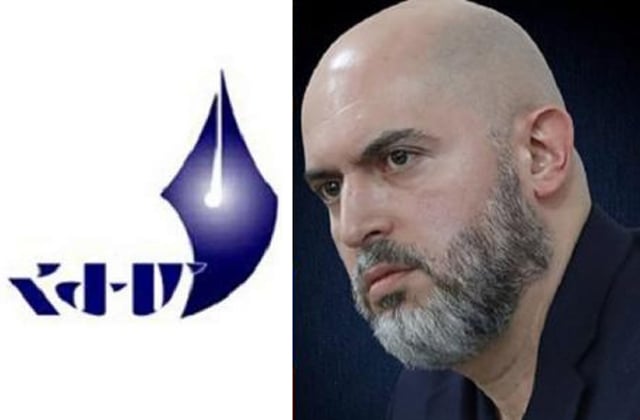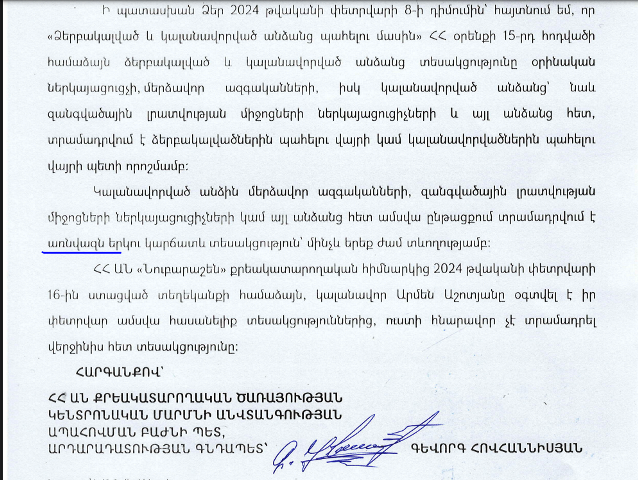Political refusal of the interview with political prisoner Armen Ashotyan in the “bastion of democracy”

On February 8, according to the order, as the president of the Union of Journalists of Armenia and the editor-in-chief of the newspaper “168 zham” and the website 168.am, I applied to the head of the Criminal Executive Service of the RA Ministry of Justice Ambakum Grigoryan, asking to allow me, the editor-in-chief of the website aravot.am Anna Israelyan and Narek Galstyan, editor-in-chief of the 24news.am website, to have an interview with Armen Ashotyan, the vice-president of the Republican Party of Armenia (RPA), at the “Nubarashen” criminal-executive institution of the RA Ministry of Justice until the end of February. In the application, I informed that Armen Ashotyan agreed to have a meeting with us in the format of an interview, which he had also fixed in his application addressed to the management of the CEI.
On February 16, our application was rejected, on absurd and lame bases, so lame that it was noticeable from the response of the relevant official of the CEI to us that they had rejected because we applied for an interview with the RPA vice-president, political prisoner Armen Ashotyan.
Thus, in the answer addressed to us the first reference was made on behalf of the head of the security department of the CEI, Colonel Gevorg Hovhannisyan, to Article 15 of the RA Law “On Keeping Arrested and Detained Persons”, according to which the visit of arrested and detained persons by a legal representative, close relatives , and detained persons with mass media representatives and other persons are provided by the decision of the head of the detention or prison facility. Then they added that the detained person is provided with AT LEAST TWO short meetings with close relatives, media representatives or other persons during the month, lasting up to 3 hours, and they “announced” that in 2024 according to the information received on February 16, Armen Ashotyan had used his available appointments for the month of February, so it is not possible to provide the appointment with him.
If the writers of this text or those who signed it did not strive to fulfill the directive of the Minister of Justice Grigor Minasyan-Nikol Pashinyan duo, they would have at least once read the reasons for their refusal. The law says “AT LEAST TWO” brief visits, which means that the same law also regulates the provision of additional visits. I am still interpreting this in the logic of the reply they sent.

By the way, for the information of the signatory of this answer, those who wrote it and those who gave the instruction to write it, in addition to the mentioned law, there is also a relevant government decision “On approving the internal regulation of places of detention and correctional facilities of the RA Ministry of Justice “, which regulates the mentioned issues.

In that decision, it is also mentioned about the procedure for providing visits, and paragraph 139 of the decision specifies who cannot be granted more visits than the number specified by RA legislation. And such cannot be provided to a person who has a negative character, who exhibits non-law-abiding behavior, who shows dishonest attitude towards work or studies, who has a penalty, or who is convicted.

Now the question is: can Gevorg Hovhannisyan, who signed the response sent to us, the head of the CEI, Ambakum Grigoryan, the Minister of Justice, Grigor Minasyan, and his boss, Nikol Pashinyan, tell us on which of the mentioned grounds Armen Ashotyan was denied an additional meeting, if we consider the meeting with the media representatives within their logic and accept it as an appointment?
I wonder how the authors of this answer imagined if the journalists with tape recorders would go and sit in the common room for a short meeting with the other visitors? Or can a family member of a detainee take a tape recorder with them on a short visit, as journalists do? And when the genius idea of “dispersing” the interview in this way was born in the heads of the above-mentioned persons, didn’t they think that questions might arise, and didn’t they know that when journalists, let’s say, cover an event at the CEI, they are simultaneously conducting interviews with detained persons or convicts, then why are they not considered visits?
Armen Ashotyan does not feel restricted in the CEI and conveys what he has to say to his audience through articles, and with or without journalists, he answers the questions that concern the society. It is not logical that the head of the Central Committee, knowing and understanding this much, could prevent the access of the editors to Armen Ashotyan and become a target. It is obvious that this decision was dictated at the highest level by Nikol Pashinyan, who reached Ambakum Grigoryan through the Grigor Minasyan channel.
Taking into account the above mentioned justifications, laws and precedents, it becomes obvious that our access to the political prisoner Armen Ashotyan for the purpose of conducting an interview was denied by the direct order of the head of the political group.
The responsible officials of the country, which declared itself a bastion of democracy, are surely well aware that the collection of information is an important preparatory step for journalistic activities and an integral part subject to the protection of press freedom. Prisoners should be able to communicate with the press unless there are compelling reasons to prohibit it in the interests of security and order, the public interest or the protection of victims, other convicts or staff. And this is fixed by the Recommendation No. 2 of the Committee of Ministers of the Council of Europe “On European Prison Rules” (2006).
Finally, in addition to domestic regulations, these issues are also regulated by international standards. And yet, Article 42 of the RA Constitution guarantees everyone’s right to freely express their opinion, which in this case is hindered by the state body. The guarantees of journalistic activities and freedom of expression are established by law, according to which media practitioners and journalists act freely based on the principles of equality, legality, freedom of expression and pluralism.
Refusal of a journalist’s application by the CEI or other competent body, for any reason of a general nature, means hindering the journalist’s professional activity, and unhindered professional journalistic work is of public importance.
P.S. By the way, our request to organize an interview with Armen Ashotyan to the management of the National Security Agency is dated February 8. We received the answer to our application on February 16. And Nikol Pashinyan was in the CEI on February 14. On February 14, the Minister of Justice Grigor Minasyan was also in the Cei. And maybe the content of the response letter sent to us by the CEI was clarified on that very day?
President of the Union of Journalists of Armenia
Satik Seyranyan

























